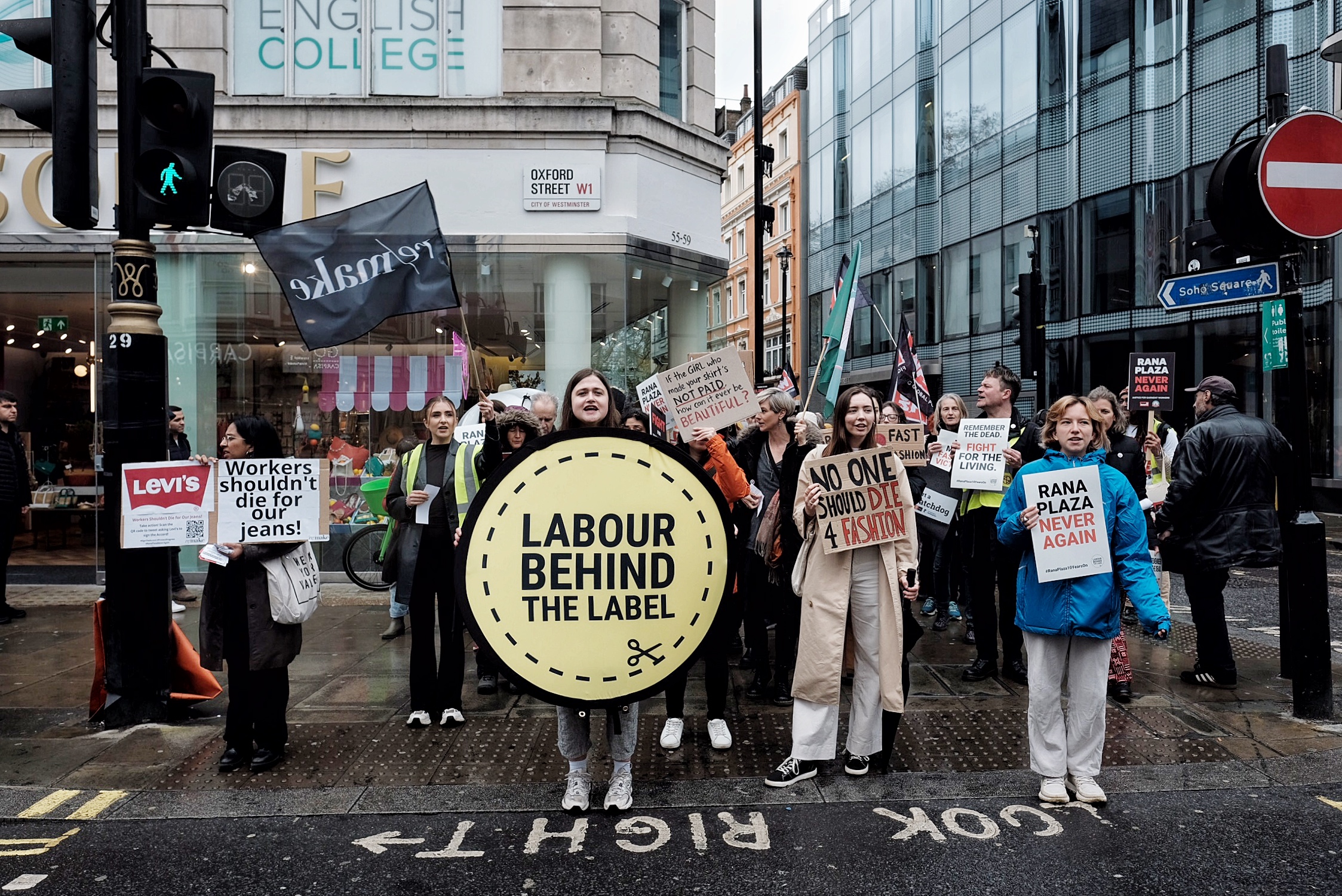As Fashion Revolution Week 2023 kicks off, we’re remembering the lives that were lost on this day 10 years ago.
We’ve covered this tragedy before, but in case you’re new here this is a brief summary of what happened on the day of the deadliest disaster in fashion’s history. On 24 April 2013, the Rana Plaza commercial building in Dhaka, Bangladesh collapsed with over 3,000 people inside. They were mostly women and children. A 17-day search and rescue effort followed. Many of the survivors were trapped under rubble for days. 2,500 people sustained injuries, some life-altering, and over 1,100 people were killed.
There were five garment factories in the complex, making clothes for brands like Primark, Benetton, Inditex (Zara, Bershka, Stradavarius), J C Penny and Walmart.
The day before, workers had notified the authorities of cracks in the building. Initially, this resulted in an evacuation and a warning that the building was unsafe. However, the owner of the building reportedly threatened to withhold pay from workers who were refusing to return.
@dietprada shared harrowing images of the rubble and the rescue efforts on their Instagram.
Talking about a (fashion) revolution
In the immediate aftermath of the deadly collapse, activists kickstarted a global rallying cry to protect garment workers. They got to work, calling on brands to provide compensation to the workers and their families. Their demands insisted that policymakers implement legislation that would prevent anything like Rana Plaza from happening again.
This resulted in the Accord on Fire and Building Safety in Bangladesh, a legally binding agreement between brands and trade unions, and the Alliance for Bangladesh Worker Safety. But safe buildings are the bare minimum that workers should expect. It was clear that much more was needed to clean up the fashion industry. Alongside the accord, Fashion Revolution was born. Founded by Carry Somers and Orsola de Castro, it grew to become the world’s largest fashion activism movement.
Fashion Revolution campaigns to end human and environmental exploitation in the global fashion industry. Every year from the 22nd – the 29th is Fashion Revolution Week. This year is especially significant as it marks a decade of activism to clean up the business of clothing.
Skirting Around the Issues
The garment industry now has an eyewatering annual turnover of almost $3 trillion. But, the sector continues to be rife with inequality, greenwashing and labour exploitation.
The owners and CEOs of the biggest fast fashion brands are billionaires, mostly men. Meanwhile, the workforce producing the garments is still 80% women. And most are making poverty wages in the Global South and in UK cities, like Leicester, where Boohoo’s clothes are made.
Similar to the way that fossil fuel companies love to talk about their investments in renewables, despite it making up a small percentage of their activity, fashion brands love to talk about sustainability. Consumers today are more sophisticated and are developing an understanding of the environmental impact of the fashion industry. As such, brands are keen to clean up their image.
The Fashion Transparency Index
Their claims do not stand up to scrutiny, though. The Fashion Transparency Index, an annual report that analyses and ranks brands found that in 2022 85% of brands still do not disclose their annual production volumes, and 96% do not publish the number of workers in their supply chain paid a living wage. So, they are not being honest about how much clothing they are churning out each year, or what they are paying workers.
What we do know is that we send staggering 10,000 items of clothing to landfill every five minutes – dumped in Kanatmanto and the Atacama desert in Chile.
Cost of Fashion Walk, London
In the midst of the London Marathon and XR’s The Big One, the Rana Plaza Solidarity Collective took to Oxford Street – London’s fashion (and consumption) epicentre – to remember the lives lost in Rana Plaza. The city was already buzzing with excitement, and hope for change was in the air.
Armed with signs and chanting for change, the march made it’s up London’s busiest retail street to remind brands of their role in the horrific tragedy. Outside Primark’s flagship store, protesters gathered to hear an impassioned speech describing the horrendous day the building came down. And the lack of response from the brands that were responsible. Shoppers and onlookers alike heard the heartbreaking reminder that 1,138 people paid the ultimate price for low-priced fast fashion.
Activists left their mark with dupes of London’s iconic blue plaques and moved on to seven more brands – most notably Levis. Remember the Accord? Well, there are still multiple brands that have still not signed it including Levis. And last year, four garment workers were killed in a Levis factory in Pakistan after inhaling poisonous gas.
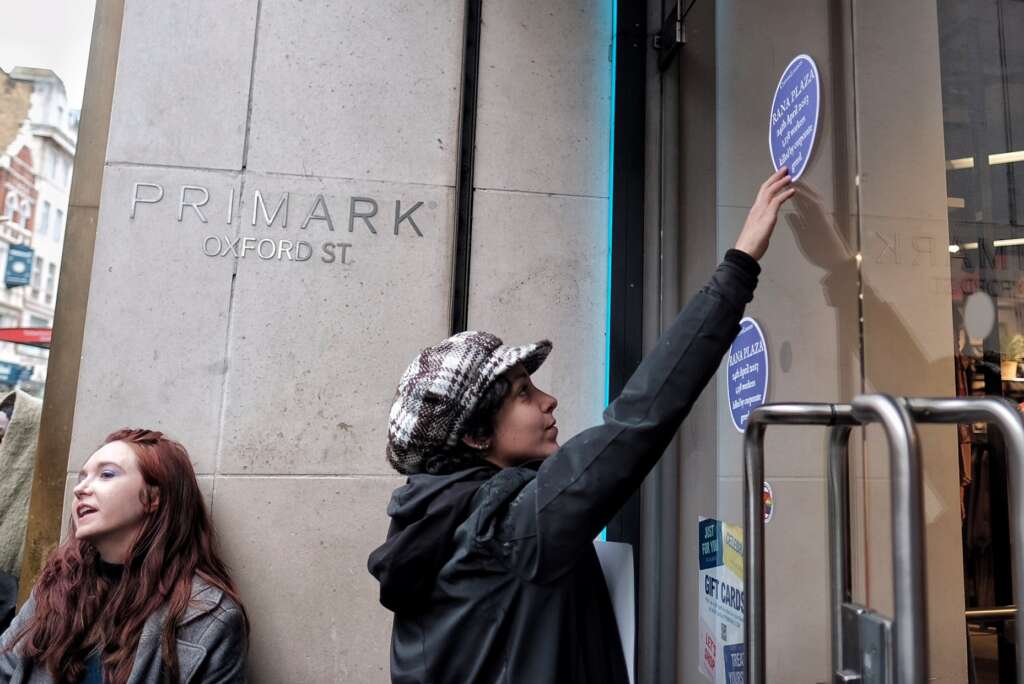
Fair fashion campaigner, Venetia La Manna, entered the store with a small group to hold Levis accountable for their atrocities. The group held a hand-stitched denim sign that read “Levis, sign the accord”. La Manna delivered a rousing speech, where she detailed some of the brand’s worst instances of worker exploitation and called them out for spending millions more on marketing than they do on worker safety. Outside, the crowd cheered them on and even attracted some shoppers, who were rightly horrified by what they were hearing.
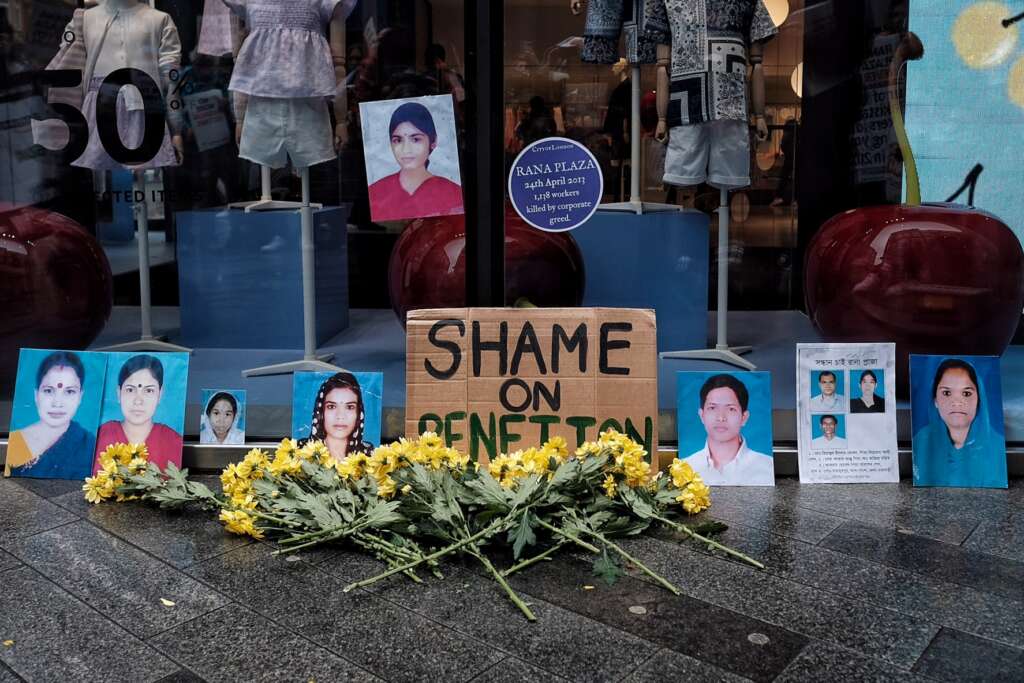
The march ended outside a second Primark store, where several people read out the names and ages of the over 1,000 people who died. Silence fell as the crowd felt the gravity of the number of deaths. Mothers, daughters, friends, neighbours. A poignant moment of remembrance for the lives cut short, in an altogether preventable disaster, because of corporate greed.
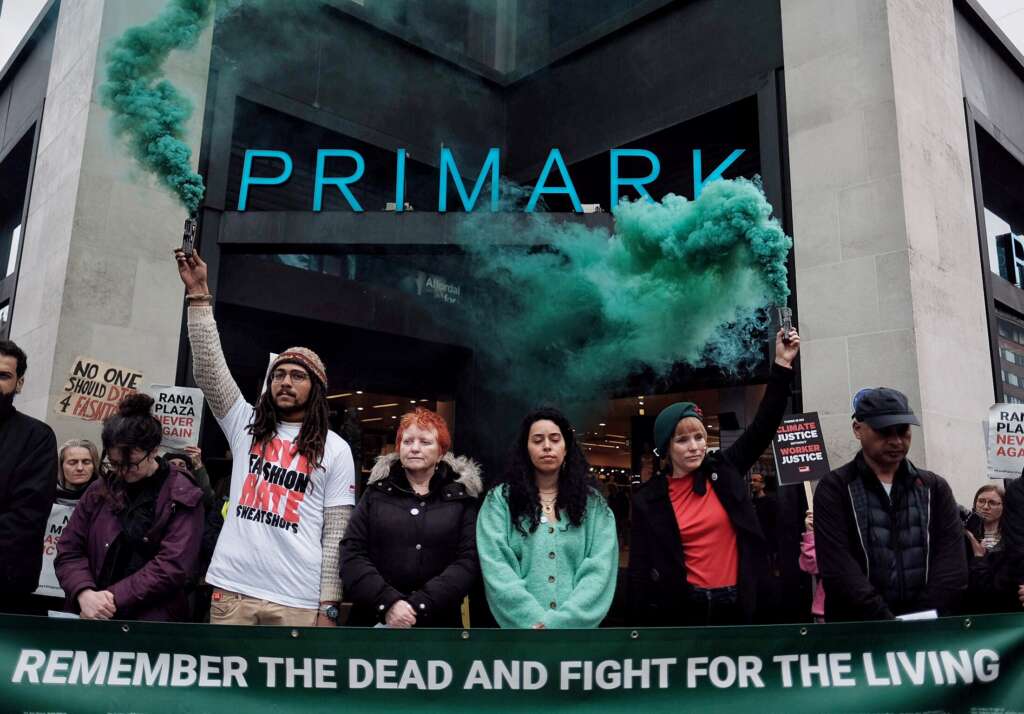
The North Remembers Rana Plaza
Manchester, in the North of England, is another vibrant city of fashionistas and ethical fashion advocates. It’s also where renowned fast fashion villains Boohoo and Missguided were founded.
At the same time that crowds were gathering to honour Rana Plaza in London, another group arrived in Picadilly Gardens in Manchester to do the same.
The Manchester Group, led by journalist Sophie Benson, made their way around the city’s fashion hotspots, calling out brands like Urban Outfitters and Primark. At night, large projections echoed their sentiments in the heart of the city centre. A visual and powerful statement, organised by digital app Whering.
3 different locations, 1 message, 1 cause:
— Whering (@whering__) April 24, 2023
NOBODY SHOULD DIE FOR FASHION#RanaPlaza10NeverAgain
An enormous thank you to @SophieBenson_ who brought us all together in Manchester, as well as @venetialamanna, @AjaSaysHello and all the incredible people who marched in London 💚 pic.twitter.com/MSygYxZ36B
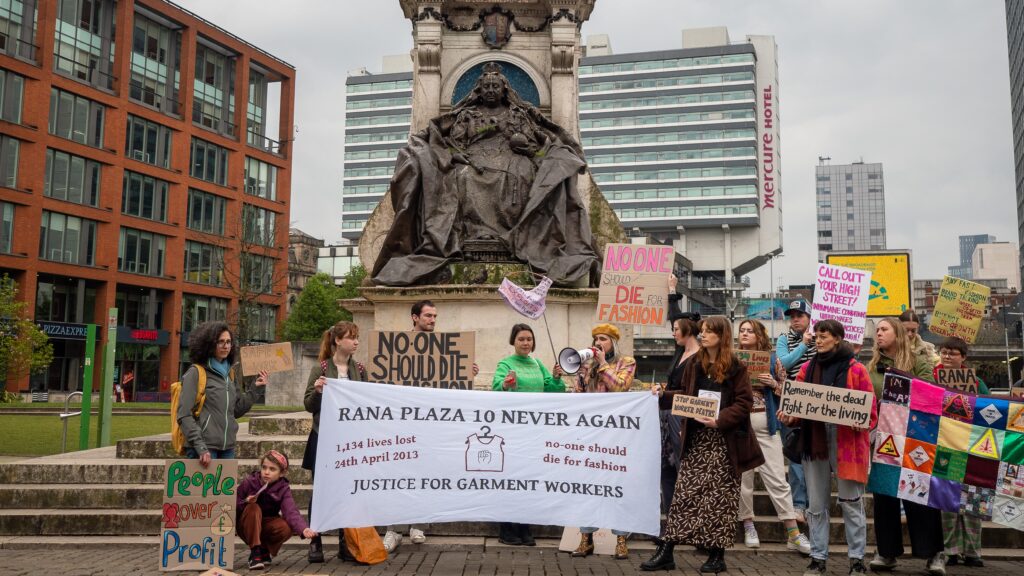
Solidarity in Singapore
Are you in Singapore and looking for a chance to join the action? Singapore’s action revolves around a compilation of creative responses to Fashion Revolution’s 10-point Manifesto. Sinagpore’s manifesto will be posted on its website on April 29th.
In commemoration of the launch of the zine, they are also organising an in-person gathering on 29 April 2023 from 4 pm – 9 pm at ZERRIN’s new pop-up location in Anchorpoint Shopping Centre. back for another year, the mending studio (from 4 pm – 7 pm) is a place to meet fellow menders and makers, exchange techniques, and bond over failed attempts while reconnecting with the clothes that need our attention. The session is a drop-in, but you are welcome to stay the duration if you want to work on your skills! At 7.30 pm, join a panel of zine contributors. Find out more on their Instagram account.
#RanaPlaza10NeverAgain
No matter where you are, or how busy you are, you can join the Fashion Revolution and make a difference. Please, follow this linktree for small actions you can take now.
Actions, like these, show us that there is so much we can achieve when we work together. Images have been shared with workers in Bangladesh, who have expressed gratitude for the solidarity and who feel more empowered to continue to fight for change, knowing their global comrades are fighting too.
FEATURED IMAGE: Photo by Angela Christofilou @protest_photos IMAGE DESCRIPTION: A group of fair fashion activists walk through London’s busy retail street, Oxford Stree, holding banners and chanting to remember the lives lost in the Rana Plaza disaster in 2013 and hold brands to account.


